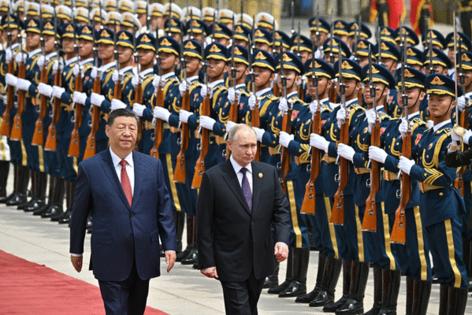LZ Granderson: Aiding Ukraine has been cheap. Caving to Russia would be far more costly
Published in Op Eds
After 20 years and $2.3 trillion spent, after more than 100,000 American and Afghan lives lost, one would think our war in Afghanistan would be more of a reference point today. Yet, outside of a few jabs from conservatives regarding President Joe Biden's handling of the exit, the war was hardly brought up at all this election cycle — despite having ended just three years earlier.
A reminder of how fast society moves and perhaps a glimpse into the future.
When was the last time you heard someone mention Ukraine in casual conversation? Back in February 2022, when Russia invaded, there were vigils in our streets. Now, more than 1,000 days later, after Congress has approved $175 billion in aid, it's likely to fade into distant memory. President-elect Donald Trump, who has repeatedly questioned funding Ukraine, has vowed to end the war quickly. Ukraine's president, Volodymyr Zelensky, said he would like to do so through "diplomatic means" next year.
While the average American probably hadn't thought much about Ukraine before the 2022 invasion, Russian President Vladimir Putin has been thinking about the country for more than 30 years.
"The breakup of the Soviet Union was the collapse of a historic Russia," he said in a documentary that aired on Russia's airwaves. Putin has also referred to his country's 1991 fall as "the greatest geopolitical catastrophe of the 20th century." For those keeping score at home, he's ranking the end of the U.S.S.R. as worse than both world wars and the 20 years in Vietnam. "We lost 40% of the territory, production capacities and population. We became a different country. What had been built over a millennium was lost to a large extent."
Make Russia Great Again may not lend itself to a pronounceable acronym, but it does clearly define Putin's foreign policy agenda. It's one predicated on a worldview that sees Ukraine as a rebellious commonwealth and not an independent democracy.
"Throwing off oppression" is a story we know well in this country. It's a story we teach our children and base our exceptionalism on. It's a story of freedom. But as we all know, freedom isn't free.
Under the Biden administration, America was willing to help Ukraine pay to keep its freedom. The incoming Trump administration has signaled this will likely not continue. Other nations will go on to help Ukraine in its fight, but without America's military and economic power, this coalition will struggle to hold together against Russia's might.
The gamble in not providing aid to Ukraine is that should that country fall, it won't satisfy Putin. His desire to restore his country's glory has been burning for three decades. Why would he stop just as resistance crumbles?
The phrase "elections have consequences" isn't just about domestic politics. There are consequences abroad as well. When most voters supported Trump's candidacy, did they fully understand what walking away from Ukraine would mean?
As former Rep. Adam Kinzinger (R-Ill.) told me: "Ukraine gave up its nukes, in exchange for peace. The fact that Russia is attacking now means that only nukes work as a deterrent, so you can expect nuclear proliferation throughout the world."
As president, Trump was slow to respond after Russia fired on and captured Ukrainian vessels and sailors back in 2018. Based on that lukewarm response, and his comments about helping Ukraine, it does make one wonder if Trump has any "red line" for Putin, and if so, what it is and what he is prepared to do to defend it. Unfortunately, there weren't many opportunities to have these conversations during this election cycle. If there had been, perhaps voters would have a better understanding about the money for Ukraine. According to Kinzinger, a member of the Air National Guard and an Air Force veteran who served in Afghanistan and Iraq, "the money spent on weapons is actually produced here in the United States and we send our old [weapons] to Ukraine. So, we're actually building jobs and refreshing our own weapons."
Normally the U.S. pays to have old weapons destroyed, Kinzinger said.
None of this rose above the noise that surrounded a campaign season saturated with misinformation. Trump's pitch for isolationism, or his willingness to ignore Ukraine, apparently resonated with many voters. And given our habit of quickly moving on from talking about war, it's doubtful many of us would even remember just how much supporting Ukraine cost us.
On the other hand, we might find abandoning Ukraine and caving to Russia has a far steeper cost — one that will be impossible for us to forget.
____
©2024 Los Angeles Times. Visit at latimes.com. Distributed by Tribune Content Agency, LLC.




























































Comments